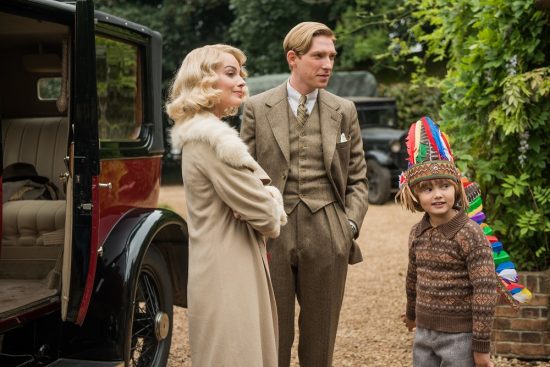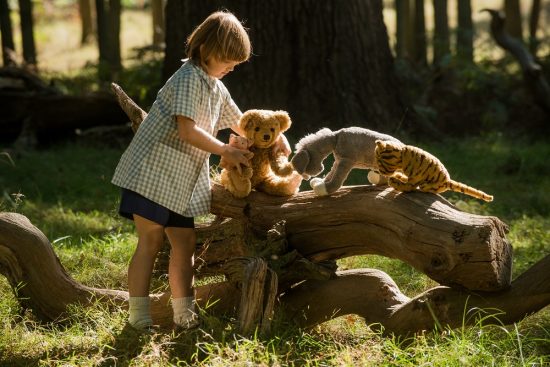Review: Goodbye Christopher Robin – “Feels like an undercooked period drama”
Equally sad, fascinating and ahead of its time when it comes to social commentary, the true story behind the creation of A. A. Milne’s Winnie the Pooh – one of the most iconic and beloved characters in children’s literature – screams film adaptation and it’s actually surprising that Hollywood hasn’t exploited it until now.
I’ve never been a huge Pooh fan and my personal acquaintance with the honey-loving bear and his human friend Christopher Robin comes mostly from the 80s Disney animated series. Yet, even most of those viewers who are familiar with the literary source will be taken aback by learning how and why Pooh’s success affected the author’s son, Christopher Robin, whose life was indeed the inspiration behind the famous stories.
As evident from his 2013 Oscar-nominated flick My Week with Marilyn, director Simon Curtis isn’t new to telling iconic real-life stories from a peculiar angle, especially when they are period pieces. Following Milne since his discharge from the British army in WWI and his PTSD-ridden return to high society and writing plays, the picture painted by screenwriters Simon Vaughan and Frank Cottrell Boyce is that of a complex and tormented man. The increasingly popular and undoubtedly talented Domhnall Gleeson plays Milne focusing on the man’s wounded soul after surviving the brutality and meaninglessness of war.
After getting married to his beloved fiancé Daphne (Margot Robbie) and having a son, whose nickname Billy Moon takes over his real one, Christopher Robin, Milne is still crippled by the trauma he has experienced, finding it hard to believe that his life and the whole country’s can just go back to normal. His constant ennui affects his creativity and he thinks he should focus on writing something poignant to denounce war and explore the future of Britain, although his wife insists he should focus on the many positive things in his life.
Overwhelmed by chaotic London and needing some peace and quiet to rekindle his muse, Milne moves the family to the countryside but his writer’s block doesn’t seem to benefit from it. Ever since Billy’s birth, nanny Olive (the ever brilliant Kelly Macdonald) has de facto become the kid’s actual parenting figure. The caring and loving woman is always there for Billy whilst his parents take part in London’s fancy social life and go on exotic holidays, so the boy understandably grows closer and closer to the woman.
With Milne stuck in his creative rut and his wife longing for the exciting London life again, things take an unexpected turn when the restless Daphne decides to take a break from the countryside life and goes back to London on her own. With Olive forced to return home to tend to her dying mother, Milne has no choice but properly take care of his son for the first time and Billy is devastated by Olive’s departure as she’s the only true parent he’s ever had. Yet the circumstances drive father and son to finally bond as they spend lots of time exploring the beautiful woods surrounding their home. Milne is introduced to Billy’s stuffed animals – a bear, a tiger, a donkey and a piglet – and they end up spending most of their time in the woods playing with the toys and creating make-believe adventures to entertain their days.
The unexpected experience inspires Milne with the idea for Winnie the Pooh and his other anthropomorphized friends playing with Christopher Robin in the Hundred Acre Wood. His books become an instant sensation and that changes the lives of Milne and his family forever, for better and for worse. Soon enough the author is asked on promotional tours and events that involve not just him but especially his son, who practically reaches a royal family level of popularity.
Offering a glimpse into what’s practically a vintage example of fame-crazed obsession that’s only missing the excesses of smartphones and social media, Billy obviously doesn’t fare well with the situation. The only one who actually sees his discomfort and tries to shield him from the spotlight is Olive, however, when the woman flags her concern with her employers, they don’t take it well, especially Daphne. By the time Milne himself becomes uncomfortable with the rotten side of fame and what is doing to his son, it may be too late.
Impeccably produced and with a solid cast across the board – including endearing newcomer Will Tilston in the titular role – Goodbye Christopher Robin disappoints due to its meandering script. Although it’s extremely interesting to learn the true story behind the creation of Winnie The Pooh – which will inevitably draw comparisons with 2004’s Finding Neverland – it feels like the film’s complex thematic threads are not developed enough and the writers have rushed through the story’s emotional beats, playing with the viewers’ heartstrings, as underlined by the film’s overbearing score.
The prologue is especially a poor narrative choice in this case as the flash-forward sets the audience up for an emotional outcome they get cheated out of when we reach the book-ended epilogue. The now young adult Christopher Robin – played by rising star Alex Lawther (The Imitation Game) – deals with the consequences of that unwanted early fame that has turned his life into a nightmare, compromising the relationship with his parents. The filmmakers, however, don’t take the proper time to develop that period of the story.
A rather hasty unravelling of the events, the not-so-subtle dialogue and the clear attempt to manipulate the viewers’ feelings waste an opportunity to explore the story’s compelling themes organically. What could’ve been a poignant social commentary, relevant to this day and age of incessant search for instant gratification and fame, feels like an undercooked period drama that might as well have been made for Sunday night TV.
Goodbye Christopher Robin is out in UK cinemas September 29th.












